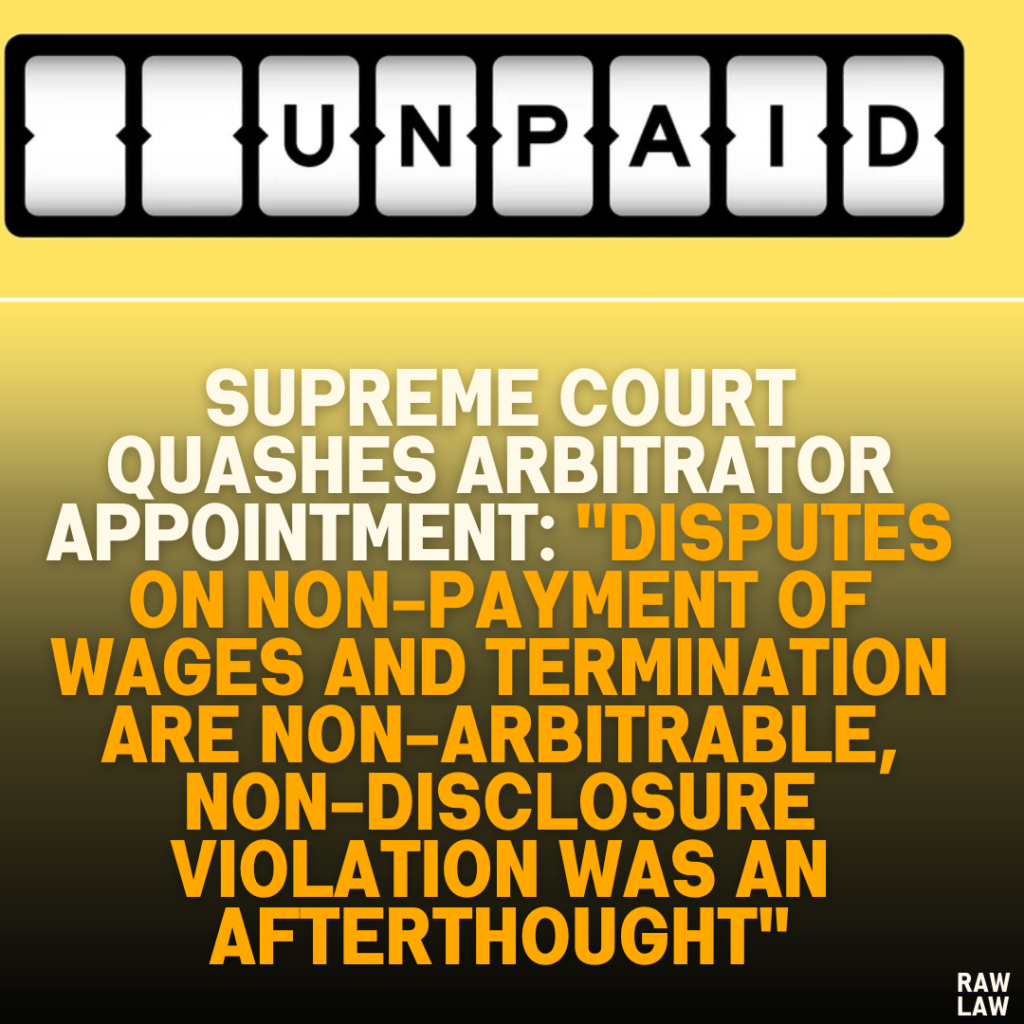Court’s Decision:
The Supreme Court of India quashed the High Court’s appointment of an arbitrator under Section 11(6) of the Arbitration and Conciliation Act, 1996. The Court held that the arbitration petition was a misuse of judicial remedies. The disputes in question were non-arbitrable as they fell under the jurisdiction of statutory authorities per the Payment of Wages Act, 1936 (PW Act) and the Industrial Disputes Act, 1947 (ID Act). The Court also dismissed the allegation of a non-disclosure violation as it was not raised during the termination process. The respondent was directed to pay ₹5 lakhs in costs to the appellant.
Facts:
- The appellant was employed as an Assistant Manager starting March 15, 2019. During the COVID-19 pandemic, the appellant was required to work from home.
- The respondent demanded physical attendance from August 2020, which the appellant refused, leading to a show-cause notice and disciplinary inquiry.
- On January 21, 2021, the appellant’s employment was terminated for absenteeism and non-cooperation, with no mention of a non-disclosure violation in the termination order.
- The appellant initiated legal proceedings for wage recovery under Section 15(2) of the PW Act and challenged the termination before the Industrial Tribunal under Section 2(A) of the ID Act.
- In response, the respondent attempted to invoke arbitration under the employment contract, unilaterally appointing an arbitrator.
- The appellant challenged the arbitrator’s jurisdiction under Section 16 of the Arbitration Act, leading to the closure of arbitral proceedings.
Issues:
- Are disputes regarding non-payment of wages and termination arbitrable?
- Was the respondent’s claim of a non-disclosure violation valid and sufficient to justify arbitration?
Petitioner’s Arguments:
The appellant contended that:
- The Payment of Wages Act and the Industrial Disputes Act provide statutory forums for resolving disputes regarding wages and termination, rendering arbitration inapplicable.
- The claim of a non-disclosure violation was not raised during the inquiry, disciplinary action, or termination process, making it an afterthought.
Respondent’s Arguments:
The respondent argued that:
- The employment contract included an arbitration clause that applied to disputes, including those relating to wages, termination, and non-disclosure violations.
- The High Court correctly appointed an arbitrator under Section 11(6) of the Arbitration Act, and the disputes should have been referred to arbitration.
Analysis of the Law:
- Non-Arbitrability of Disputes: The Court emphasized that disputes under the PW Act and ID Act are non-arbitrable because:
- Section 22 of the PW Act explicitly bars suits in civil courts for wage recovery when statutory remedies are available.
- Section 2(A) of the ID Act confers exclusive jurisdiction to the Industrial Tribunal for termination disputes.
- Fourfold Test for Arbitrability: The Court relied on the test outlined in Vidya Drolia v. Durga Trading Corporation (2021), which states that disputes are non-arbitrable if:
- They relate to inalienable sovereign functions.
- They involve third-party rights or have public implications.
- Statutes explicitly bar arbitration.
- They require centralized adjudication by statutory forums.
- Baseless Allegations: The claim of a non-disclosure violation under Clause 19 was not part of the show-cause notice, inquiry report, or termination order. The Court concluded that this claim was a contrived attempt to support the arbitration petition.
- Unilateral Arbitrator Appointment: Relying on Perkins Eastman Architects DPC v. HSCC (India) Ltd. (2020), the Court invalidated the respondent’s unilateral appointment of an arbitrator as it lacked the appellant’s consent.
Precedent Analysis:
The Court referenced:
- Perkins Eastman Architects DPC (2020): This case invalidated unilateral arbitrator appointments when they lacked mutual consent.
- Vidya Drolia (2021): The Court reiterated the criteria for non-arbitrability of disputes, especially those governed by mandatory statutory provisions.
Court’s Reasoning:
- The disputes about non-payment of wages and termination were already being adjudicated by statutory authorities under the PW Act and ID Act. These disputes are explicitly non-arbitrable under Sections 22 and 23 of the PW Act and corresponding provisions of the ID Act.
- The claim of a non-disclosure violation was not substantiated by any evidence or referenced in prior proceedings. The Court deemed this allegation a retrospective and baseless attempt to invoke arbitration.
- The respondent’s arbitration petition under Section 11(6) was filed to coerce the appellant into abandoning statutory remedies, amounting to an abuse of process.
Conclusion:
The Supreme Court:
- Quashed the High Court’s order appointing an arbitrator under Section 11(6) of the Arbitration Act.
- Dismissed the arbitration petition as non-maintainable.
- Ordered the respondent to pay ₹5 lakhs in costs to the appellant within three months.
Implications:
- The judgment reinforces the principle that disputes under labor statutes like the PW Act and ID Act are not subject to arbitration and must be resolved through statutory forums.
- Employers cannot misuse arbitration clauses to bypass statutory protections or coerce employees into unfavorable settlements.
- The decision underscores the invalidity of retrospective allegations or unilateral arbitrator appointments without mutual consent.



